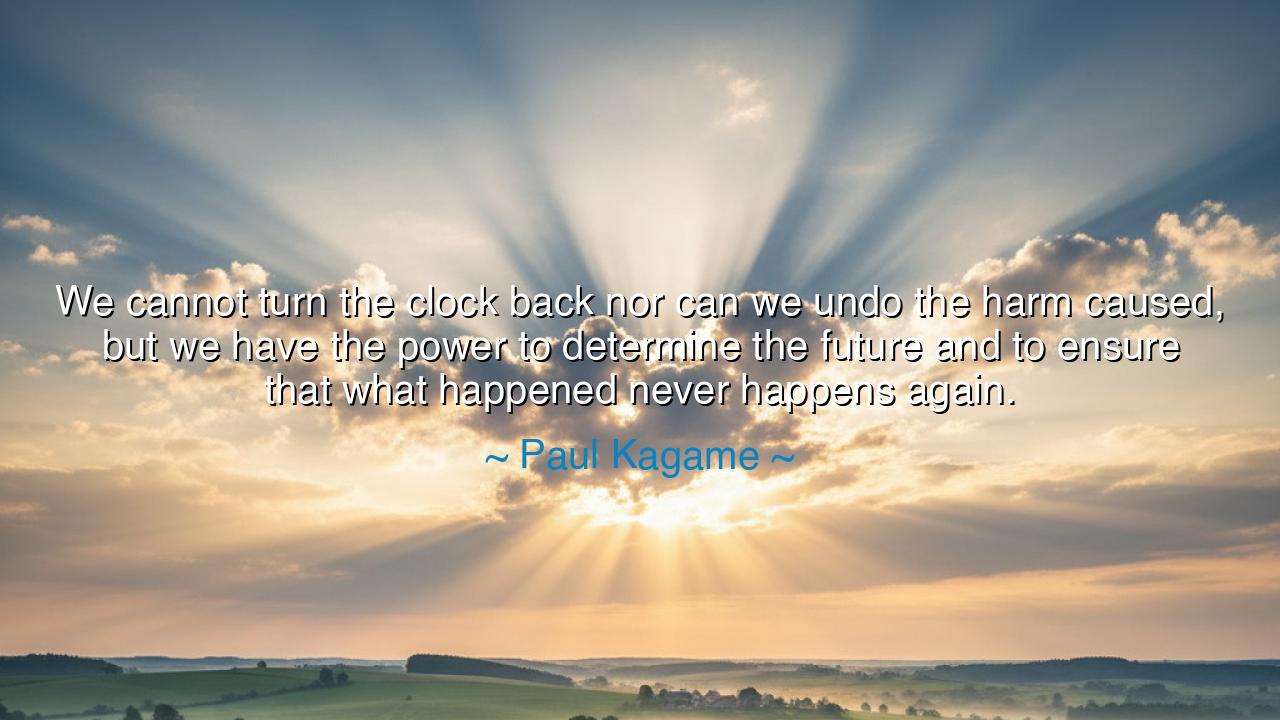
We cannot turn the clock back nor can we undo the harm caused
We cannot turn the clock back nor can we undo the harm caused, but we have the power to determine the future and to ensure that what happened never happens again.






"We cannot turn the clock back nor can we undo the harm caused, but we have the power to determine the future and to ensure that what happened never happens again." These words by Paul Kagame carry with them a profound sense of both regret and hope, as well as an understanding of the complexity of the human condition. The quote acknowledges the injustices of the past and the irreversibility of certain actions, but it also emphasizes the power we possess in shaping the future. In moments of great tragedy, we may feel as though the damage is irreversible, but Kagame’s words remind us that while we cannot undo the past, we hold the responsibility—and the ability—to influence the course of what is yet to come.
In the ancient world, there was a deep understanding that fate could not always be escaped, yet humans still held the agency to shape their destinies through action. The Greeks spoke often of the tragic hero, whose flaws or decisions led to suffering, and yet, even in the midst of suffering, there was often a moment of recognition—the hero would come to understand the consequences of their actions, and, sometimes, through that knowledge, there was a chance to act differently and ensure that future generations might be spared such tragedy. Sophocles’ Oedipus Rex tells the story of a king whose actions led to catastrophe, but the true power of the play lies not just in his suffering but in the realization that while the past could not be undone, future generations could be spared if the hero accepted responsibility for his actions. Kagame, too, emphasizes this power: while we cannot erase the harm already done, we can control what happens next.
The most poignant example of this wisdom in recent history is found in Rwanda, the very country that Kagame leads. The Rwandan Genocide—a brutal period of violence and ethnic division—was a tragedy that left deep scars on the nation. In the aftermath of the genocide, Kagame's leadership was crucial in guiding Rwanda through a process of healing, reconciliation, and nation-building. Kagame’s vision, reflected in his quote, is that while the horrors of the past cannot be undone, the future can be shaped by the collective will of the people, working together to ensure that such violence never happens again. The lesson from Rwanda, and from Kagame’s leadership, is that the power to prevent future harm lies not in ignoring the past, but in confronting it honestly and using that confrontation to build a stronger, more unified future.
In ancient Rome, there was a tradition of using the past as a foundation for understanding how to govern the future. Cicero, the Roman statesman and philosopher, believed that learning from history was essential for good governance. He argued that while the past was filled with both wisdom and mistakes, it was the present generation's responsibility to act in such a way that they learned from previous errors and ensured that history would not repeat itself. Much like Kagame, Cicero understood that while we cannot change what has come before, the future is ours to shape. His ideas were foundational in the development of Roman law and governance, and his thoughts on the importance of learning from past mistakes continue to resonate today.
The strength of Kagame's words lies in their call to action—a challenge to not just mourn the past but to act in the present to create a better future. The recognition of past wrongs—whether in Rwanda, Rome, or any other part of the world—is not enough. Action is required. It is not enough to simply remember the pain; we must act to prevent it from happening again. This is the challenge that humanity has faced throughout history: to take the lessons of the past and use them as catalysts for progress and growth. Whether it was the signing of the Magna Carta in medieval England, which laid the groundwork for modern democratic principles, or the civil rights movement in the United States, which sought to undo centuries of racial inequality, history shows that the power to shape the future lies in action—in the decisions we make today.
Kagame’s words offer us a compelling lesson: the power to change the future lies not in wishing for things to be different, but in the courage and resolve to act in ways that lead to transformation. To prevent the tragedies of the past from repeating, we must take responsibility for our present and future. This responsibility is not just to ourselves but to future generations—those who will inherit the world we leave behind. We must act with wisdom, compassion, and a fierce commitment to creating a world that is just and peaceful, understanding that our actions today have the power to shape the world for years to come.
The lesson here is clear: while the past cannot be undone, the future is in our hands. Let us take responsibility for the mistakes of history, learn from them, and work to ensure that the mistakes of the past are not repeated. The future is shaped not by what we inherit but by what we choose to create. Let us be courageous in our actions, determined in our efforts to prevent harm, and committed to building a better world for those who will follow us. History teaches us that while we may not be able to turn the clock back, we have the power to turn the tide toward a future where peace, justice, and wisdom guide our path.






AAdministratorAdministrator
Welcome, honored guests. Please leave a comment, we will respond soon